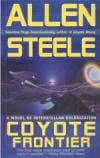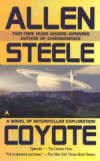 This expanded edition contains all previously published Near Space short stories and novelettes. The stories range from action to reflection, from joy to melancholy. The stories are presented chronologically, starting from the beginning of the Near Space timeline, in more or less the present era, and ending with the advanced colonised solar system of Mr. Chicago.
This expanded edition contains all previously published Near Space short stories and novelettes. The stories range from action to reflection, from joy to melancholy. The stories are presented chronologically, starting from the beginning of the Near Space timeline, in more or less the present era, and ending with the advanced colonised solar system of Mr. Chicago.
As he mentions in the introduction, Mr. Steele has been labelled a “Space Romantic”, and this is rather accurate. His stories are infused with an infectious sense of wonder about space exploration in the near future. His focus on the working stiff rather than the movers and shakers gives rise to interesting reflections and themes. Having read all or some of the Near Space long fiction is not a pre-requisite for reading this collection, though it will fill in some of the background.































